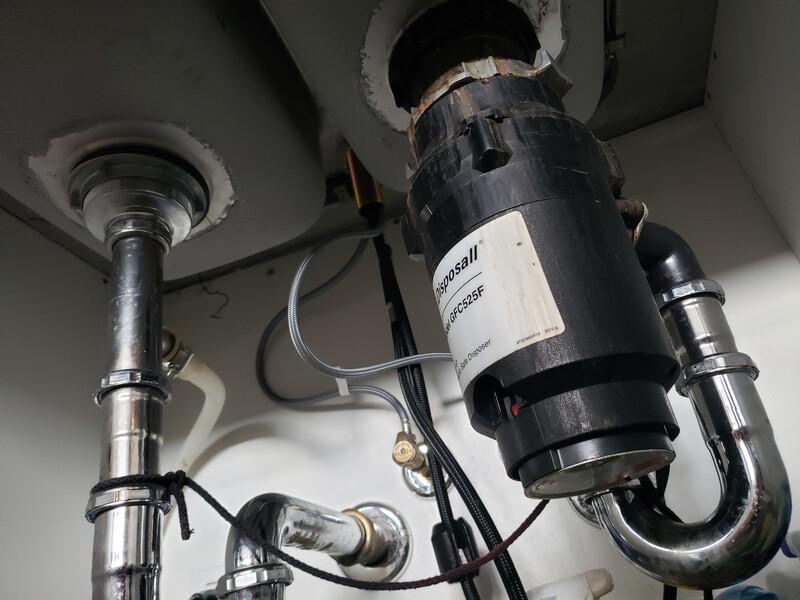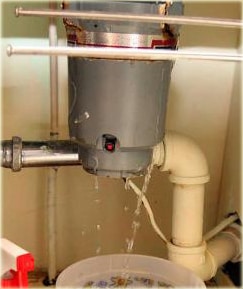Easy-to-Follow Techniques for Repairing a Leaky Garbage Disposal
Easy-to-Follow Techniques for Repairing a Leaky Garbage Disposal
Blog Article
Right here down the page yow will discover a good deal of exceptional insights involving Why Is .

Garbage disposals are vital kitchen appliances that assist in taking care of food waste effectively. However, a dripping garbage disposal can be an irritating and messy trouble to deal with. Fortunately, lots of leaks can be repaired quickly with a few basic actions. In this write-up, we will certainly go over exactly how to deal with a dripping garbage disposal successfully.
Introduction
Garbage disposals are mounted under kitchen sinks and are developed to shred food waste right into smaller sized pieces, permitting it to pass through the plumbing system easily. While these gadgets are typically dependable, leakages can happen with time because of damage, loosened connections, or damages to the device.
Step-by-Step Guide to Dealing With a Leaking Garbage Disposal
Switch off the Power
Prior to attempting any type of fixings, make sure that the power to the garbage disposal unit is shut off to avoid the risk of electric shock.
Situate the Leak
Determine the precise location of the leak and identify the cause
Tighten Connections
Use a wrench to tighten any kind of loose links between the disposal unit and the plumbing system.
Change Seals or Gaskets
If the leakage is because of worn seals or gaskets, get rid of the old parts and change them with new ones.
Patching Cracks or Openings
For splits or openings in the disposal system, usage epoxy or an appropriate patching product to seal the broken area.
Determining the Resource of the Leak
Before trying to fix a leaking waste disposal unit, it is necessary to determine the resource of the leak. This can normally be done with visual inspection or by performing easy examinations.
Visual Examination
Inspect the garbage disposal system carefully for any signs of water leak. Pay attention to locations around seals, gaskets, and connection factors.
Examining for Leaks
One way to test for leaks is by running water through the disposal system and checking for any type of visible indications of leak.
Usual Causes of Leakages in Rubbish Disposals
Worn Seals and Gaskets
Seals and gaskets play a crucial duty in protecting against water from dripping out of the waste disposal unit. In time, these parts can wear away, bring about leaks around the disposal unit.
Loose Links
The links in between the garbage disposal and the pipes system can end up being loosened in time, creating water to leak out throughout operation.
Splits or Holes in the Disposal Device
Physical damage to the waste disposal unit, such as cracks or openings in the housing, can additionally cause leaks.
Tools and Materials Needed for Repairing a Dripping Waste Disposal Unit
Prior to starting the repair process, collect the needed devices and products, consisting of a screwdriver, flexible wrench, plumber's putty, replacement seals or gaskets, and epoxy or patching material for fixing cracks or openings.
Examining the Waste Disposal Unit After Fixing
As soon as the repair service is total, test the waste disposal unit by running water with it to guarantee that the leak has actually been fixed.
Preventive Maintenance Tips to Stay Clear Of Future Leakages
To prevent future leaks, it is vital to do regular upkeep on your garbage disposal. This consists of keeping it tidy, avoiding placing non-food items or tough items down the disposal, and regularly checking for leakages or other problems.
Final thought
Finally, repairing a dripping garbage disposal is a reasonably simple process that can be finished with basic tools and materials. By adhering to the actions laid out in this post and practicing preventive upkeep, you can keep your waste disposal unit in good working problem and stay clear of expensive repair services in the future.
What to Do About a Leaking Garbage Disposal
A leaking garbage disposal often goes unnoticed until you confront a sopping cabinet, a foul-smelling puddle, or an audible drip-drip-drip from the unit. The fix can be frustrating, too, because the leak can stem from a number of components in the system. Fortunately, with a little sleuthing, you can zero in on the leak and—depending on the exact location—stop the icky oozing and repair the component that caused it. Worst case scenario, if it turns out that the garbage disposal must be replaced, installing a new one is a reasonable do-it-yourself task for those with basic plumbing skills. Read on to keep the cash you’d otherwise hand over to a pro.
Prepare to find the leak
Prior to testing the garbage disposal for leaks, unplug it at the wall outlet and turn off the power from the breaker box to prevent electrical shock. Then insert a watertight sink stopper into your sink drain and wipe the unit dry with a clean cloth. In any handy container, mix a few drops of food coloring into a few cups of water, and pour the dyed water onto the sink stopper to help you locate the leak.
Investigate the source
the top, where the disposal meets the sink drain the side, where the dishwasher hose or main drain pipe connects to the disposal or the bottom of the unit Inspect each of these locations while gliding a light-colored rag over the unit; the dyed water will readily show on the rag and reveal the location of the leak. If a leak isn’t immediately apparent, remove the sink stopper and pour a few more cups of dyed water down the sink drain, then check for leaks again. Leaks near the top of the unit are more likely to show themselves while the sink is plugged, while side and bottom leaks are more noticeable while the sink is unplugged.
The metal sink flange that sits directly inside the sink drain is typically sealed around the top with plumber’s putty (a clay-like sealant) and then secured from under the sink with bolts. If the plumber’s putty deteriorates, or the bolts loosen, the flange can no longer form a watertight seal between the sink drain and the disposal—which could cause a leak at the top of the unit.
To reseal the leaky flange, you must first detach the garbage disposal. Start by loosening the screws securing the main drain pipe to the disposal, then loosen the screws in the metal clamp securing the dishwasher hose to the disposal and detach the drain pipe and dishwasher hose from the disposal. Loosen the screws in the mounting ring that connects the disposal to the metal mounting assembly beneath the sink, then pull down the disposal and carefully set it on a clean, dry surface. Loosen the bolts in the mounting assembly with a wrench, then pull down the mounting assembly and set it near the disposal.

As a keen reader about Garbage Disposal Leaking From Bottom, I figured sharing that segment was sensible. Are you aware of anybody else who is fascinated by the niche? Take a moment to promote it. Thanks a lot for your time. Kindly come visit our website back soon.
Call Us Now Report this page